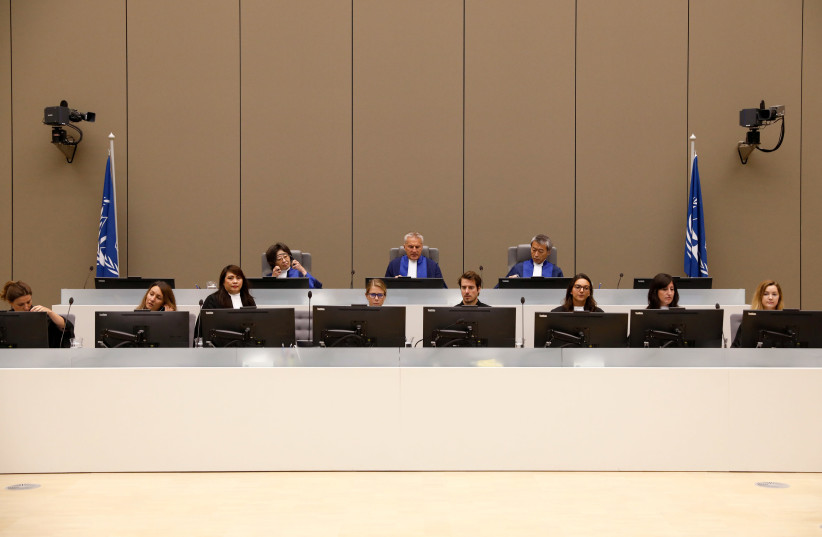by Tovah Lazaroff
A look into the ICC's investigation into the Jewish state for "war crimes."
 |
Presiding Judge Robert Fremr in the courtroom at the ICC (International Criminal Court) in the Hague, the Netherlands, 2018
(photo credit: BAS CZERWINSKI/POOL VIA REUTERS)
|
1. The International Criminal Court finished its preliminary examination and wants to open a war crimes investigation into Israeli and Palestinian actions in Gaza, east Jerusalem and the West Bank beginning from June 13, 2014.
2. If the case moves to the trial stage, then the court could issue arrest warrants against high-level Israelis and Palestinians. On the Israeli side, this could include Prime Minister Benjamin Netanyahu, Former defense ministers Avigdor Liberman and Moshe Ya’alon, IDF Chief of Staff Lt.-Gen. Aviv Kochavi and former IDF Chiefs of Staff Lt.-Gens. Benny Gantz and Gadi Eisenkot.
3. ICC Prosecutor Fatou Bensouda stated Friday she believes that war crimes were committed by both Israelis and Palestinians.
4. Bensouda plans to investigate the 2014 Gaza war, the "Great March of Return" along the Gaza border that began in March 2018, Israeli settlement activity in the West Bank and Jewish building in east Jerusalem. She will focus on the IDF’s disproportionate response and willful killing. With regard to Hamas and Palestinian armed groups, she will examine their rocket attacks, willful killing, use of human shields and torture. Bensouda did not mention Palestinian teenager Mohammed Abu Khdeir in July 2014, but based on the dates of her investigation, his kidnapping and murder in Jerusalem by Jewish extremists could also be included. The first and second Gaza wars are not part of the scope of the investigation.
5. The ICC is governed by the Rome Statute created in 1998. Some 123 nations are parties to the treaty. Israel and the United States initially signed the treaty, but never ratified it and are not considered to be parties to the statute. The court first began operating in 2002 and does not hear any cases relating to events that occurred prior to its founding. This means that the issue of Israeli annexation of the Golan Heights and east Jerusalem could never come before the court.
6. The Palestinian Authority signed the Rome Statute in January 2015. It did so three years after the UN General Assembly granted the Palestinians the status of a non-member observer state at the UN. The upgrade gave the Palestinians de-facto statehood status and awarded them the same rights to sign treaties as UN member states. The ICC opened a preliminary investigation into the situation in January 2015. It was only in May of 2018, however, that the PA asked Bensouda to open an investigation into human rights crimes committed on its territory. A pre-trial chamber was also assigned in 2018.
7. Prior to opening an investigation, Bensouda asked the ICC’s pre-trial chamber to rule within 120 days on the issue of Palestinian statehood, as it applies to the Palestinian standing before the court and to defining the territory over which the court has jurisdiction. She told the chamber that she believes Palestine is a state before the court, because it signed the Rome Statute and because the UN recognizes it as a non-member state. She also based her belief on multiple UN resolutions that speak of the “occupied Palestinian territory” as east Jerusalem, Gaza and the West Bank.
8. Israel holds that the ICC has no jurisdiction because Israel is not a party to the treaty, there is no state of Palestine, and the PA is not sovereign in the territory in question. It has argued that signing onto the treaty does not grant it statehood status before the ICC.
9. The ICC is already investigating at least twelve other situations including in the Democratic Republic of the Congo, Uganda, Central African Republic, Kenya, Libya, Cote D’ivoire, Mali, Central African Republic II, Georgia, Burundi and Bangladesh/Myanmar. It is also examining the genocide in Darfur. In addition, it is holding eight preliminary investigations and has heard or is hearing 27 cases. The ICC has also issued at least 34 arrest warrants.
10. Bensouda is Gambia’s former justice minister. She has served as the ICC’s chief prosecutor since 2012 and has worked for the court since 2004.
Tovah Lazaroff
Source: https://www.jpost.com/Arab-Israeli-Conflict/Ten-things-to-know-about-the-ICCs-war-crimes-probe-against-Israel-611721
Follow Middle East and Terrorism on Twitter
No comments:
Post a Comment